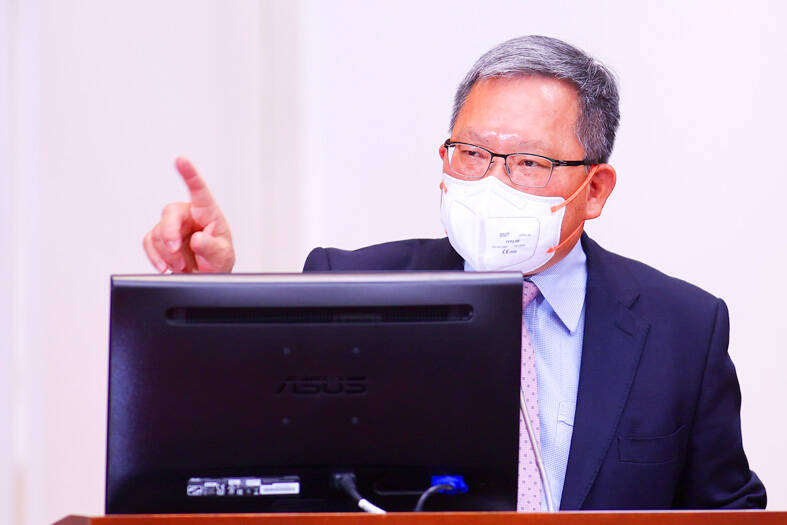Taiwan does not have the “Dutch disease,” Minister of Finance Su Jain-rong (蘇建榮) said yesterday, referring to an overreliance on a temporarily surging sector at the cost of other industries.
The government supports a variety of sectors, not just the semiconductor industry, whose development “does not harm other sectors,” he said.
Su’s comments came after opposition lawmakers said that Taiwan has become overly reliant on a few tech firms, while non-tech manufacturing sectors are declining.

Photo: CNA
The term “Dutch disease” was coined in 1977 by The Economist to describe the decline of the Dutch manufacturing sector after the discovery of the large Groningen natural gas field in 1959.
The Netherlands posted annual trade surpluses from 1970 to 1980 on the back of natural gas exports, which drove up the country’s currency and led to manufacturers becoming less competitive internationally, with many eventually moving their production abroad.
Lawmakers said the local economy is comparable to the Netherlands at the time.
Taiwan’s “small and open” economy is taking a similar development as the European country, with increasing reliance on chip exports, and profitability and wages in the chip sector and other industries increasingly diverging, they said.
Su dismissed the comparison, saying the government has sought to promote the “five plus two” industries by developing Taiwan into a regional technology hub, shoring up local firms that supply smart machinery, and developing green energy sources, biomedicine and national defense.
President Tsai Ing-wen (蔡英文) is seeking to establish a new agricultural model and a circular economy, Su said.
Local semiconductor firms command global leadership positions, but small and medium-sized firms in other sectors also contribute significantly to GDP growth and employ many people, he said.
The central bank has said that Taiwan’s non-tech manufacturers, such as suppliers of plastic and chemical products, remain competitive, although they generate less added value than local tech firms.
Local makers of steel products, bicycles and vehicle parts have gained significant global market shares, the central bank said.
However, non-tech manufacturers lag behind tech firms in terms of wages, but that is due to supply and demand in the job market, rather than resource distribution or currency movements, it said.
Local electronics suppliers have benefitted from a work-from-home boom during the COVID-19 pandemic and global supply chains moving away from China, the central bank said.

SEMICONDUCTORS: The German laser and plasma generator company will expand its local services as its specialized offerings support Taiwan’s semiconductor industries Trumpf SE + Co KG, a global leader in supplying laser technology and plasma generators used in chip production, is expanding its investments in Taiwan in an effort to deeply integrate into the global semiconductor supply chain in the pursuit of growth. The company, headquartered in Ditzingen, Germany, has invested significantly in a newly inaugurated regional technical center for plasma generators in Taoyuan, its latest expansion in Taiwan after being engaged in various industries for more than 25 years. The center, the first of its kind Trumpf built outside Germany, aims to serve customers from Taiwan, Japan, Southeast Asia and South Korea,

Nvidia Corp chief executive officer Jensen Huang (黃仁勳) on Monday introduced the company’s latest supercomputer platform, featuring six new chips made by Taiwan Semiconductor Manufacturing Co (TSMC, 台積電), saying that it is now “in full production.” “If Vera Rubin is going to be in time for this year, it must be in production by now, and so, today I can tell you that Vera Rubin is in full production,” Huang said during his keynote speech at CES in Las Vegas. The rollout of six concurrent chips for Vera Rubin — the company’s next-generation artificial intelligence (AI) computing platform — marks a strategic

Gasoline and diesel prices at domestic fuel stations are to fall NT$0.2 per liter this week, down for a second consecutive week, CPC Corp, Taiwan (台灣中油) and Formosa Petrochemical Corp (台塑石化) announced yesterday. Effective today, gasoline prices at CPC and Formosa stations are to drop to NT$26.4, NT$27.9 and NT$29.9 per liter for 92, 95 and 98-octane unleaded gasoline respectively, the companies said in separate statements. The price of premium diesel is to fall to NT$24.8 per liter at CPC stations and NT$24.6 at Formosa pumps, they said. The price adjustments came even as international crude oil prices rose last week, as traders

Taiwan Semiconductor Manufacturing Co (TSMC, 台積電), which supplies advanced chips to Nvidia Corp and Apple Inc, yesterday reported NT$1.046 trillion (US$33.1 billion) in revenue for last quarter, driven by constantly strong demand for artificial intelligence (AI) chips, falling in the upper end of its forecast. Based on TSMC’s financial guidance, revenue would expand about 22 percent sequentially to the range from US$32.2 billion to US$33.4 billion during the final quarter of 2024, it told investors in October last year. Last year in total, revenue jumped 31.61 percent to NT$3.81 trillion, compared with NT$2.89 trillion generated in the year before, according to